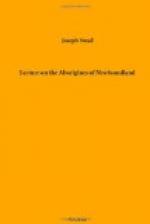The several proclamations issued, in favor of the Red Indian, seem to have been entirely disregarded—the work of extermination proceeded, and the Government again thought it necessary to express its abhorrence of the murders that were continually being perpetrated, and to threaten punishment to the guilty. Accordingly a proclamation, in the name of the Prince Regent, was issued by Sir R. Keats in 1813, to the same effect, and offering the same reward as the previous ones. For the next four years, or from 1814 to 1818, no additional efforts were made for the benefit of the Indians; but complaints were made by various persons during that period,—residents to the northward,—of thefts, which it was alleged were committed by the Indians. In consequence of these repeated losses, the person who had sustained the greatest injury, amounting to about L150, made application to the Government for permission to follow the property and regain it, if possible. This permission being given, a party of ten men left the Exploits on the 1st of March, 1819, with a most anxious desire, as they state, of being able to take some of the Indians, and thus, through them, to open a friendly communication with the rest. The leader of the party giving strict orders not on any account to commence hostilities without positive directions. On the 2nd March a few wigwams were seen and examined, they appeared to be frequented by the Indians during spring and autumn for the purpose of killing deer. On the 3rd a fire placed on the side of a brook was seen, where some Indians had recently slept. On the 4th the party reached a store-house belonging to the Indians, and on entering it they found five traps belonging to and recognized as the property of persons in Twillingate, as also part of a boat’s jib—footsteps also were seen about the store-house, and these tracks were followed with speed and caution. On the 5th the party reached a very large pond, and foot-marks of two or more Indians were distinctly discovered, and soon after an Indian was seen walking in the direction of the spot where the party were concealed, while three other Indians were perceived further off and going in a contrary direction. The curiosity of the whole party being strongly excited, the leader of them showed himself openly on the point. When the Indian discovered him she was for a moment motionless, then screamed violently and ran off—at this time the persons in pursuit were in ignorance as to whether the Indian was male or female. One of the party immediately started in pursuit, but did not gain on her until he had taken off his jacket and rackets, when he came up with her fast; as she kept looking back at her pursuer over her shoulder; he dropped his gun on the snow and held up his hands to shew her he was unarmed, and on pointing to his gun, which was some distance behind, she stopped—he did the same, then he advanced and gave her his hand, she gave her’s to him, and to all the party as




